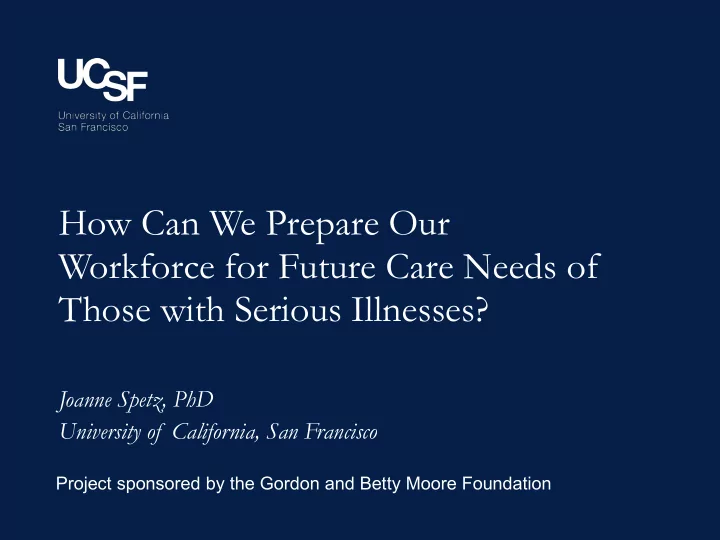

How Can We Prepare Our Workforce for Future Care Needs of Those with Serious Illnesses? Joanne Spetz, PhD University of California, San Francisco Project sponsored by the Gordon and Betty Moore Foundation
Growth in serious and complex illness increases need for well-prepared workforce Individuals living with serious illness in the community face many barriers to receiving care The lack of an adequately prepared workforce is a critical barrier Recommendations to address this problem have been made by the Institute of Medicine and other organizations, but progress toward change has been slow. We convened a Workforce Summit to: • Review recommendations previously made • Proposed new ideas • Prioritize recommendations Goal: recommendations for the next 3-5 years 2
The Workforce Summit May, 2018, in Napa, California Planning Committee of national experts Organization of Summit • 3 half-day panels framed by 2-3 discussion papers ‒ Reaction panel after presentations ‒ Break-out groups to prioritize/add recommendations • Half-day prioritization of recommendations ‒ Voting to create final prioritized list • “Nuts-and-bolts” half-day developing action plans 3
40 attendees Academic (UCSF, Duke, Dartmouth, Harvard/MGH, UC-Davis, VCU, U Iowa, Rush U, Drexel, Stanford) Professional organizations (AGS, AACN, N4A, ABFM, AOTA) Government (HRSA, VA) Non-profits (VitalTalk, Coalition to Transform Advanced Care, Center to Advance Palliative Care, Ariadne Labs) Advocacy organizations, unions (LeadingAge, Family Caregiver Alliance, National Domestic Workers Alliance, Eldercare Workforce Alliance, SEIU UHW West) Payers/business (United Health/TeamMD, Centene, OPTUM, Kaiser Permanente) Foundations (Macy, Hartford) 4
Commissioned discussion papers Advance care planning and integration of care planning into primary care Clinician communications regarding prognosis and patient preferences Strategies for building a culturally competent workforce A vision for the palliative care workforce Supporting family caregivers Supporting direct care workers Linking patients with social services 5
16 Recommendations Expand the Pipeline 1. Education programs should increase clinical experiences in the care of people with a serious illness during pre-licensure and certification education programs, and health care systems should actively offer such experiences. 2. Congress should ensure funding of relevant programs such as the Geriatrics Workforce Enhancement program. This has been done. 3. Health care leaders should advocate for payment models that incentivize working in geriatrics, gerontology, palliative care, and team-based care. 6
Incorporate Family Caregivers Into Health Care Teams 4. Foundations and government funders should commission reviews of the literature on approaches that best support family members in the care of those with a serious illness and prepare clinicians to work with family members as part of the care team. 5. Stakeholder organizations should disseminate the results of such reviews through development, fielding, and evaluation of education curricula for clinicians and family members. 7
Support The Home Care Workforce 6. Dual Medicare-Medicaid programs should provide incentives and create programs to improve home care worker pay and working conditions. 7. Leading models for home care aide training should be adopted by all state Medicaid programs and regulatory agencies. 8. Researchers should conduct rigorous studies of the impact of higher pay, lower turnover, and better training for home care aides on client outcomes and total health care costs. 8
Leverage Technology To Advance Patient- Centered Team Care 9. Insurance companies should pressure purchasers of EHRs to demand modules that elicit and record patient goals of care, identify the full care team, and share this information across providers and settings. The SIREN Network is organizing such an effort. 10. Health information technology developers should create systems to link EHR data on social determinants of health to social workers and community programs. 11. A learning collaborative similar to the agriculture Cooperative Extension Model should be established to support technology advancement in health care delivery. 9
Advocate For Payment Models That Support Community-Based Team-Focused Serious Illness Care 12. Medicare Advantage plans should actively offer new services that meet enrollees’ social needs, support clinicians as they develop strategies to link patients to such services, and evaluate how these services impact quality and value of care. 13. CMS should expand the Independence at Home program, as well as other evidence-based programs that better meet the needs of those with a serious illness living at home and incentivize team- based care in geriatrics and gerontology. 10
Instill Cultural Competency And Humility Skills Across All Health Professions 14. Foundations and government funders should create a national workgroup to define minimum cultural humility and communications competencies and curricula for all health care providers. 15. Licensing and certification boards, and education credentialing boards, should mandate inclusion of the recommended cultural humility and communications competencies in all pre-licensure and certification programs and for continuing education. 11
Track The Workforce 16. A job analysis should be conducted of emerging care coordination and navigation occupations to improve their definition and ensure inclusion in the Standard Occupational Classification. 12
Next steps & collaboration opportunities Special issue of Journal of the American Geriatrics Society for the discussion papers & recommendations Continue to build out the recommendations with more detail One or more papers on the recommendations for other journals Webinars Direct communication with stakeholders Move these recommendations forward to meet care needs of those with serious illness 13
Recommend
More recommend